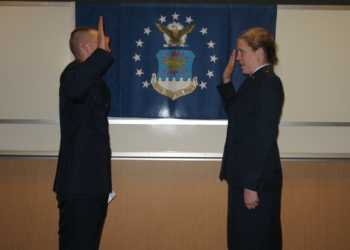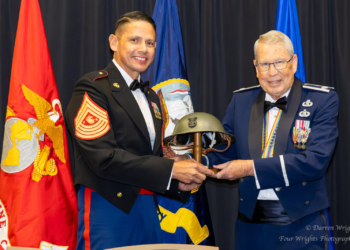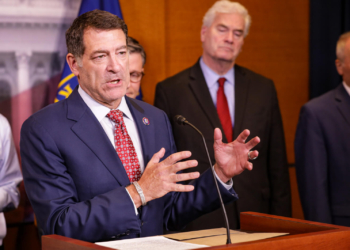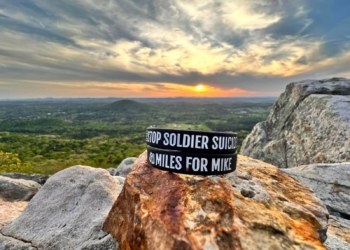Dr. Adam Ingrao was medically discharged as a private first class from the Army after a stateside training accident tore ligaments in his right ankle. He used his GI Bill to attend California Polytechnic State University, San Luis Obispo, and a beekeeping class his first semester changed everything.
“From that moment on, my entire life has been dedicated to honeybees,” said Ingrao, founder of Heroes to Hives, a veteran-oriented program offered through the Michigan State University Extension.
That course was the first time since leaving the military that Ingrao says he felt like he was still serving his country — just this time through protecting food security. It also was therapeutic.
After being sent home from the Army, he watched as his battle buddies, some of whom never returned, were deployed.
“[I was] constantly dealing with guilt of not being there for them,” Ingrao said. “And a lot of veterans struggle with that, reliving the past.”
Ingrao and his wife moved to Michigan in 2013 after Michigan State University recruited him to complete his doctorate. They immediately began buying bees to build their own beekeeping operation, which became Bee Wise Farms.
He initially ran Hives for Heroes through the farm, paying out-of-pocket to have five veterans spend a season beekeeping on the farm. He held lectures in his living room and his woodshop became a lab.
As he looked for ways to expand, Ingrao reached out to MSU. In its first year partnered with the university, Heroes to Hives had 15 students in the nine-month program.
“Now the program is the largest agriculture training program for veterans in the world,” Ingrao said. “Over 5,000 people were in the program this year.”
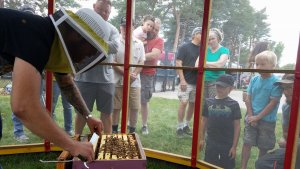
Marine veteran Nick Kaminski came to Heroes to Hives a few years after leaving the service.
“Everybody’s experience of war is different, and everybody’s experience of recovery is different,” Kaminski said. “Speaking from my own personal journey, I would have to say that working with bees has been healing in the sense that you have to nurture your bees, you have to take care of them.”
Kaminski, who served from 2003 to 2014 with three overseas deployments (Iraq from 2005-2006 and 2007-2008; Afghanistan in 2011), opened Hickory Tree Farm Apiaries in 2014 at his childhood home in Michigan. “We didn’t know how big of a role the honeybees were going to play in that, but it was something we wanted to have on our [farm],” he said.
About three years into his beekeeping journey, Kaminski participated in Heroes to Hives. While he said he had been “pretty proficient” up to that point, he was lacking in some skills.
“It gave me a very solid knowledge base in how to scientifically approach beekeeping and how to be successful,” Kaminski said.
Additionally, Ingrao says, anecdotal evidence shows that “inherent healing” occurs through working with bees, but there are no metrics at this point.
Beekeeping has given Kaminski a sense of purpose — something he didn’t have after leaving the service.
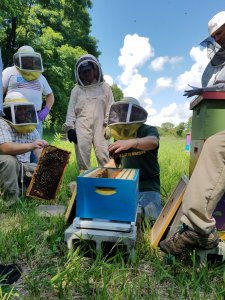
“One of the most important jobs that we have right now as a country moving forward is our food security and our ecological security,” Kaminski said. “What I have seen myself evolve into is looking for a purpose and looking for direction and in many ways working with bees has given me a great deal of purpose.”
Similarly, the work has been “transformative” in helping Ingrao accept being a disabled veteran.
“I don’t go talk to counselors. My bees are my counselors,” Ingrao said.
About 20% of veterans who have been through the program have started a business, while about half either incorporate beehives into existing farm operations or have a couple beehives in their backyard to use as a “therapeutic mechanism.”
In 2019, Heroes to Hives expanded from MSU to include partnerships with the University of Missouri Extension, University of Central Missouri, University Nebraska-Lincoln, and the University of Minnesota.
A pilot program with a Veterans of Foreign Wars Post also started in 2020, and there are plans to bring on more posts, according to Ingrao.
Those interested in participating in Heroes to Hives can complete an interest form. Registration begins Nov. 1.
Additional veteran beekeeping and farming programs
Several beekeeping and farming programs for veterans have been established throughout the country, including:
- Bees 4 Vets (Nevada)
- Bee Veterans (Minnesota)
- Farmers Assisting Returning Veterans (Texas)
- Farmer Veteran Coalition (California)
- Freedom Farm for Vets (Illinois)
- Growing Veterans (Washington)
- Servicemember Agricultural Vocation Education Farm (Kansas)
- Urban Ark Conservation (Pennsylvania)
- Veterans Healing Farm (North Carolina): http://veteranshealingfarm.org/
- VetRest (Oregon)
- Veterans & Heroes to Agriculture (West Virginia)
- Hives for Heroes (Texas)
Read comments





















